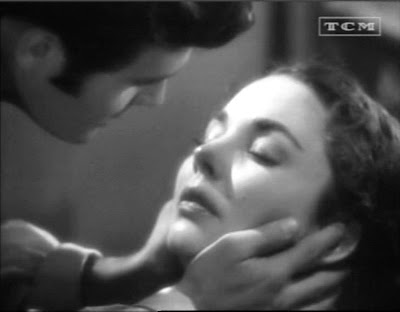. .
.
Vincente Minnelli’s film faced a singular problem: Gustave Flaubert’s book, the pinnacle of the 19th Century realistic novel, is hostile in method and purpose to the gloss of classic Hollywood, because its material is precisely about the chasm between life and romanticisation. Casting the likes of Louis Jourdan as Emma’s aristocratic lover is a touch that dances close to turning it into the kind of breathless exotic romance that Emma laps up, and Jennifer Jones’ apple cheeks and James Mason’s voiceover construct a more sentimental creature than the woman Flaubert etched.
.
.
The framework – Flaubert’s trial for obscenity over the novel – is problematic because it’s a filmmaker’s confrontation with the Hays Code, equally inimicable to tales of feckless adultery that resolve with suicide, and also because it’s used as a neat device to introduce a softer authorial voice that pleads for empathy for Emma, at odds with the novelist Flaubert’s self-effacing voice and rigorously ironic analysis of the situation and characters. Where the film needs dirt and sex, it has the bland Hollywood idea of rural town life. Too often buried substance is alchemised into platitude, as in the painful concluding moments where Mason has to batter us with a moral.
.
Despite these limitations, Minnelli’s Bovary is an intriguing and finally affecting work that, like Jones’ performance (she’s not generally an actress I like), improves as it proceeds, deepens, and turns sour. Minnelli tended to put the melody in melodrama, turning his dramatic films into dances of image and emotion, for better or worse. Appropriately, then, Bovary finds its feet during the brilliantly staged waltz sequence that sees Emma intoxicated by motion and the promise of having finally achieved her fantasy, to the extent where Jourdan orders the windows smashed to avoid having her faint and so ruin their dance, whilst her husband (Van Heflin, born, or at least dictated by type-casting as weak husbands, to play Charles Bovary), fleeced at cards and loaded, lurches about, desperately calling her name, the plaintively ugly call of mediocre reality. It’s a sequence where the technique fuses together perspective, psychology and theme with perfect grace, and achieves a perfect note of hysteria – the mad clash of worlds bends Emma’s mind in a knot. It’s also highly inventive cinema of the first order, not usually found in starchy cinematic adaptations.
.
.
The final quarter is necessarily grim, and the more hypnotic for being so, in watching the train wreck of Emma’s life. Emma’s choice of fantasy sees her worn away relentlessly, falling into somewhat dutiful passion in her consolation romance with Dupuis (Alf “Christopher Kent” Kjellin), a penurious law clerk pretending to be a lawyer, reduced to grovelling with Jourdan and creditors, until the numbing end sees a shopboy encountering her in a darkened drug store, like a vampiric wraith, except rather than consuming someone else, she’s wolfing down handfuls of arsenic with the same reckless gusto she ate life. A film that pays a salutary nod to the passions and sorrows (or lack thereof) of its characters, it’s a work of a certain independent grace.
.





















